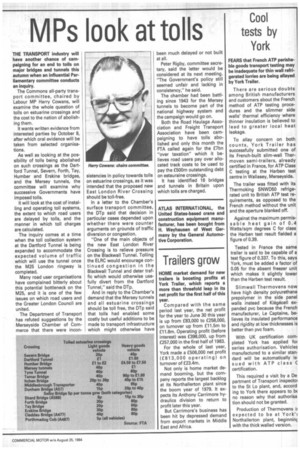MPs look at tolls
Page 9

If you've noticed an error in this article please click here to report it so we can fix it.
THE TRANSPORT industry will have another chance of campaigning for an end to tolls on major bridges and tunnels this autumn when an influential Parliamentary committee conducts an inquiry.
The Commons all-party transport committee, chaired by Labour MP Harry Cowans, will examine the whole question of tolls on estuarine crossings and the cost to the nation of abolishing them.
It wants written evidence from interested parties by October 8, after which oral evidence will be taken from selected organisations.
As well as looking at the possibility of tolls being abolished on such crossings as the Dartford Tunnel, Severn, Forth, Tay, Humber and Erskine bridges, and the Mersey tunnels, the committee will examine why successive Governments have imposed tolls.
It will look at the cost of installing and operating toll systems, the extent to which road users are delayed by tolls, and the manner in which toll charges are calculated.
The inquiry comes at a time when the toll collection system at the Dartford Tunnel is being expanded to accommodate the expected volume of traffic which will use the tunnel once the M25 London ringway is completed.
Many road user organisations have complained bitterly about this potential bottleneck on the M25, and it is one of the few issues on which road users and the Greater London Council are united.
The Department of Transport has refuted suggestions by the Merseyside Chamber of Commerce that there were incon sistencies in policy towards tolls on estuarine crossings, as it was intended that the proposed new East London River Crossing should be toll-free.
In a letter to the Chamber's surface transport committee, the DTp said that decision in particular cases depended upon whether there were counter arguments on grounds of traffic diversion or congestion.
"One of the main objects of the new East London River Crossing is to relieve pressure on the Blackwell Tunnel. Tolling the ELRC would encourage continued congestion in the Blackwell Tunnel and deter traffic which would otherwise usefully divert from the Dartford Tunnel," said the DTp.
And in reply to the Chamber's demand that the Mersey tunnels and all estuarine crossings should be toll free, the DTp said that tolls had enabled some costly but useful additions to be made to transport infrastructure which might otherwise have been much delayed or not built at all.
Peter Rigby, committee secretary, said the letter would be considered at its next meeting. "The Government's policy still seemed unfair and lacking in consistency," he said.
The chamber had been battling since 1943 for the Mersey tunnels to become part of the national highway system and the campaign would go on.
Both the Road Haulage Association and Freight Transport Association have been campaigning to have tolls abolished and only this month the FTA called again for the £7bn "over taxation" which it believes road users pay over allocated track costs to be used to pay the £500m outstanding debt on estauraine crossings.
It has identified 16 bridges and tunnels in Britain upon which tolls are charged.












































































































